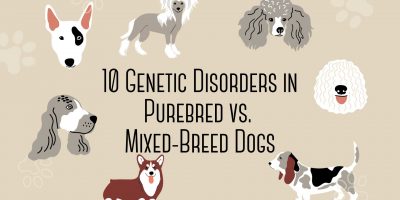
How Much Does Pet Insurance Cost?
Get a clear understanding of the expenses involved in pet insurance. Discover the factors that influence pricing and make informed decisions to ensure your furry companion gets the coverage they deserve.

Pet owners commonly assume that purebred dogs are more prone to inherited disorders and that mixed-breed dogs are healthier.
Is this a fact or a myth?
Research suggests that this distinction is not always so categorical.
Pet owners of purebred dogs are given higher pet insurance premiums because their pets may need coverage for inherited disorders. However, the latest data shows that the generalization of purebreds as less healthy and more prone to inherited genetic disorders is not always true.
One study investigated 10 genetic conditions and compared them to see whether mixed-breed or purebred had a higher chance of inheriting them.
The most shocking finding was that most purebred subgroups are just as statistically likely to develop disorders as much as mixed breed dogs are for 7 genetic conditions.
This disproves the common assumption that mixed breed dogs are healthier than purebreds.
Purebreds are more likely to have only 3 out of the 10 examined genetic disorders.

To better understand which dog breeds, have a higher prevalence of inheriting these conditions, they have been categorized into subgroups.
The American Kennel Club has seven groups of dogs depending on the breed’s characteristics and functions the dogs were originally bred for.
The groups and some popular breeds of that category are as follows:
|
Conditions |
Certain subgroups of purebred had a higher disposition for developing |
Purebred subpopulations do not differ statistically from mixed-breed dogs |
|
Aortic stenosis |
Atopy/allergic dermatitis |
Aortic stenosis |
|
Skin allergies |
Hypothyroidism |
Bloat |
|
Bloat |
Intervertebral disk disease |
Early-onset cataracts |
|
Early-onset cataracts |
|
Dilated cardiomyopathy |
|
Dilated cardiomyopathy |
|
Elbow dysplasia |
|
Elbow dysplasia |
|
Epilepsy |
|
Epilepsy |
|
Portosystemic shunt |
|
Hypothyroidism |
|
|
|
Intervertebral disk disease |
|
|
|
Hepatic portosystemic shunt |
|
|
Aortic stenosis is a narrowing above the aortic heart valve or the aortic valve itself. It is statistically more common in working, sporting, and herding subgroups of dogs.
Large breed dogs are most affected by an abnormal growth of tissues, leading to malformation and degeneration of the joint. Herding, sporting, and working subgroups, especially Golden retrievers, the Newfoundland, German shepherds, Bernese Mountain Dogs, and Rottweilers, are all known to be predisposed to elbow dysplasia.
Stomach dilatation or bloat is a serious condition and can be fatal if left untreated. Non-sporting and working subgroups of dogs are significantly more affected by this disease.
Repeated brain seizures are one of the most frequently reported neurological disorders in dogs. In most cases, epilepsy cannot be cured. Herding, hound, and sporting are more prone to developing epilepsy.
As the name suggests, this condition develops early in a dog’s life by clouding the lens inside the eye, causing blindness. Non-sporting and sporting subgroups of purebred dogs were found to have a greater probability of developing this condition.
Terrier and toy grouping have an increased incidence of a portosystemic shunt. This condition is an abnormal connection where blood is diverted around the liver rather than into it. Surgery is often needed to treat and correct the shunt.
This genetic condition creates enlargement of the chambers of the heart and thinning of the muscle wall. It typically affects large and giant-sized dogs of the hound, sporting, and working subgroup of dogs.
Atopy or allergic dermatitis is a condition that is dogs suffer from frequently depending on environmental circumstances or genetics.
The underactive production of thyroid hormones can affect a dog’s quality of life in many ways. This disease is not life-threatening and inexpensive to treat.
IVDD causes problems with the disks between the vertebrae of the spine leading to neurological issues. This degenerative process can affect the dog’s ability to walk and often requires surgical intervention.
It is interesting to note that although the risk is increased for most subgroups of developing this condition, the terrier subgroup has reduced risk compared to mixed-breed dogs.
|
|
Hound |
Working |
Sporting |
Non-Sporting |
Terrier |
Toy |
Herding |
|
Aortic stenosis |
|
Increased Risk |
Increased Risk |
|
|
|
Increased Risk |
|
Bloat
|
|
Increased Risk |
|
Increased Risk |
|
|
|
|
Early-onset cataracts |
|
|
Increased Risk
|
Increased Risk
|
|
|
|
|
Dilated cardiomyopathy
|
Increased Risk |
Increased Risk
|
Increased Risk
|
|
|
|
|
|
Elbow dysplasia
|
|
Increased Risk
|
Increased Risk
|
|
|
|
Increased Risk
|
|
Epilepsy
|
Increased Risk |
|
Increased Risk |
|
|
|
Increased Risk |
|
Hepatic portosystemic shunt
|
|
|
|
|
Increased Risk
|
Increased Risk
|
|
|
Skin allergies
|
|
|
Increased Risk
|
Increased Risk
|
Increased Risk
|
Increased Risk
|
|
|
Hypothyroidism
|
Increased Risk
|
Increased Risk
|
Increased Risk
|
Increased Risk
|
|
|
|
|
Intervertebral disk disease
|
Increased Risk
|
Increased Risk
|
|
Increased Risk
|
Reduced Risk |
|
Increased Risk
|
Empty cells mean the risk is not statistically distinct from a mixed breed developing the same condition.
Pet owners need to be aware of the health risks and conditions their pet is predisposed to develop. Early screenings and responsible breeding are just some ways pet owners can reduce the prevalence of these conditions among the dog population.
Hence, the common assumption that purebred dogs are unhealthier than mixed breed is not always true.
Browse our curated list of vendors to find the best solution for your needs.
Subscribe to our newsletter for the latest trends, expert tips, and workplace insights!

Get a clear understanding of the expenses involved in pet insurance. Discover the factors that influence pricing and make informed decisions to ensure your furry companion gets the coverage they deserve.

Gain knowledge of canine genetics by navigating health facts in purebred vs. mixed-breed dogs.

From golden retriever to beagle – uncover the most popular dog breeds and the approximate cost to insure them.
Used by most of the top employee benefits consultants in the US, Shortlister is where you can find, research and select HR and benefits vendors for your clients.
Shortlister helps you reach your ideal prospects. Claim your free account to control your message and receive employer, consultant and health plan leads.